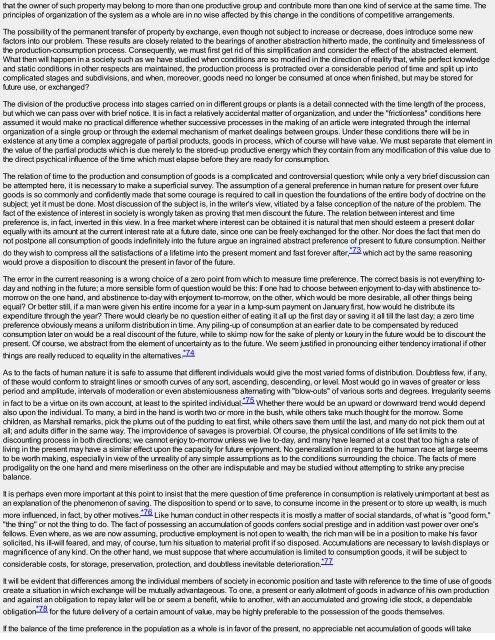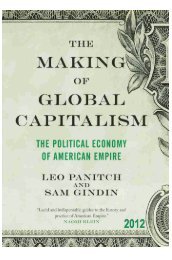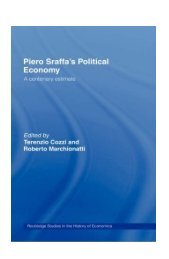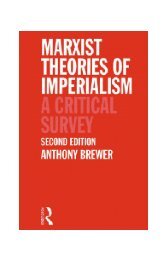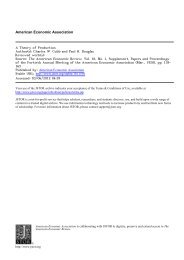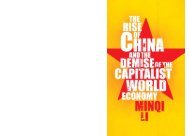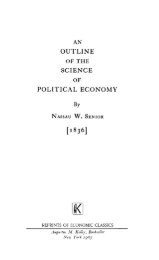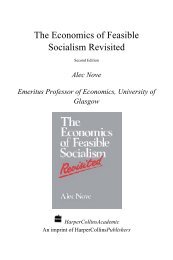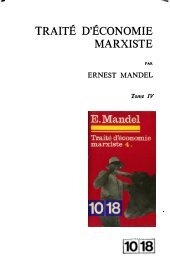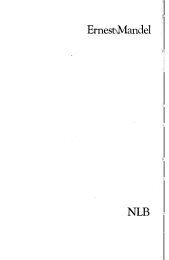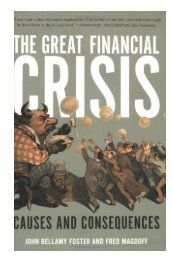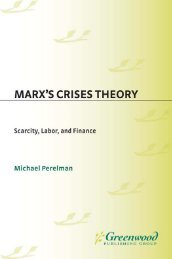that the owner of such property may belong to more than one productive group <strong>and</strong> contribute more than one kind of service at the same time. Theprinciples of organization of the system as a whole are in no wise affected by this change in the conditions of competitive arrangements.The possibility of the permanent transfer of property by exchange, even though not subject to increase or decrease, does introduce some newfactors into our problem. These results are closely related to the bearings of another abstraction hitherto made, the continuity <strong>and</strong> timelessness ofthe production-consumption process. Consequently, we must first get rid of this simplification <strong>and</strong> consider the effect of the abstracted element.What then will happen in a society such as we have studied when conditions are so modified in the direction of reality that, while perfect knowledge<strong>and</strong> static conditions in other respects are maintained, the production process is protracted over a considerable period of time <strong>and</strong> split up intocomplicated stages <strong>and</strong> subdivisions, <strong>and</strong> when, moreover, goods need no longer be consumed at once when finished, but may be stored forfuture use, or exchanged?The division of the productive process into stages carried on in different groups or plants is a detail connected with the time length of the process,but which we can pass over with brief notice. It is in fact a relatively accidental matter of organization, <strong>and</strong> under the "frictionless" conditions hereassumed it would make no practical difference whether successive processes in the making of an article were integrated through the internalorganization of a single group or through the external mechanism of market dealings between groups. Under these conditions there will be inexistence at any time a complex aggregate of partial products, goods in process, which of course will have value. We must separate that element inthe value of the partial products which is due merely to the stored-up productive energy which they contain from any modification of this value due tothe direct psychical influence of the time which must elapse before they are ready for consumption.The relation of time to the production <strong>and</strong> consumption of goods is a complicated <strong>and</strong> controversial question; while only a very brief discussion canbe attempted here, it is necessary to make a superficial survey. The assumption of a general preference in human nature for present over futuregoods is so commonly <strong>and</strong> confidently made that some courage is required to call in question the foundations of the entire body of doctrine on thesubject; yet it must be done. Most discussion of the subject is, in the writer's view, vitiated by a false conception of the nature of the problem. Thefact of the existence of interest in society is wrongly taken as proving that men discount the future. The relation between interest <strong>and</strong> timepreference is, in fact, inverted in this view. In a free market where interest can be obtained it is natural that men should esteem a present dollarequally with its amount at the current interest rate at a future date, since one can be freely exchanged for the other. Nor does the fact that men donot postpone all consumption of goods indefinitely into the future argue an ingrained abstract preference of present to future consumption. Neitherdo they wish to compress all the satisfactions of a lifetime into the present moment <strong>and</strong> fast forever after, *73 which act by the same reasoningwould prove a disposition to discount the present in favor of the future.The error in the current reasoning is a wrong choice of a zero point from which to measure time preference. The correct basis is not everything today<strong>and</strong> nothing in the future; a more sensible form of question would be this: If one had to choose between enjoyment to-day with abstinence tomorrowon the one h<strong>and</strong>, <strong>and</strong> abstinence to-day with enjoyment to-morrow, on the other, which would be more desirable, all other things beingequal? Or better still, if a man were given his entire income for a year in a lump-sum payment on January first, how would he distribute itsexpenditure through the year? There would clearly be no question either of eating it all up the first day or saving it all till the last day; a zero timepreference obviously means a uniform distribution in time. Any piling-up of consumption at an earlier date to be compensated by reducedconsumption later on would be a real discount of the future, while to skimp now for the sake of plenty or luxury in the future would be to discount thepresent. Of course, we abstract from the element of uncertainty as to the future. We seem justified in pronouncing either tendency irrational if otherthings are really reduced to equality in the alternatives. *74As to the facts of human nature it is safe to assume that different individuals would give the most varied forms of distribution. Doubtless few, if any,of these would conform to straight lines or smooth curves of any sort, ascending, descending, or level. Most would go in waves of greater or lessperiod <strong>and</strong> amplitude, intervals of moderation or even abstemiousness alternating with "blow-outs" of various sorts <strong>and</strong> degrees. Irregularity seemsin fact to be a virtue on its own account, at least to the spirited individual. *75 Whether there would be an upward or downward trend would dependalso upon the individual. To many, a bird in the h<strong>and</strong> is worth two or more in the bush, while others take much thought for the morrow. Somechildren, as Marshall remarks, pick the plums out of the pudding to eat first, while others save them until the last, <strong>and</strong> many do not pick them out atall; <strong>and</strong> adults differ in the same way. The improvidence of savages is proverbial. Of course, the physical conditions of life set limits to thediscounting process in both directions; we cannot enjoy to-morrow unless we live to-day, <strong>and</strong> many have learned at a cost that too high a rate ofliving in the present may have a similar effect upon the capacity for future enjoyment. No generalization in regard to the human race at large seemsto be worth making, especially in view of the unreality of any simple assumptions as to the conditions surrounding the choice. The facts of mereprodigality on the one h<strong>and</strong> <strong>and</strong> mere miserliness on the other are indisputable <strong>and</strong> may be studied without attempting to strike any precisebalance.It is perhaps even more important at this point to insist that the mere question of time preference in consumption is relatively unimportant at best asan explanation of the phenomenon of saving. The disposition to spend or to save, to consume income in the present or to store up wealth, is muchmore influenced, in fact, by other motives. *76 Like human conduct in other respects it is mostly a matter of social st<strong>and</strong>ards, of what is "good form,""the thing" or not the thing to do. The fact of possessing an accumulation of goods confers social prestige <strong>and</strong> in addition vast power over one'sfellows. Even where, as we are now assuming, productive employment is not open to wealth, the rich man will be in a position to make his favorsolicited, his ill-will feared, <strong>and</strong> may, of course, turn his situation to material profit if so disposed. Accumulations are necessary to lavish displays ormagnificence of any kind. On the other h<strong>and</strong>, we must suppose that where accumulation is limited to consumption goods, it will be subject toconsiderable costs, for storage, preservation, protection, <strong>and</strong> doubtless inevitable deterioration. *77It will be evident that differences among the individual members of society in economic position <strong>and</strong> taste with reference to the time of use of goodscreate a situation in which exchange will be mutually advantageous. To one, a present or early allotment of goods in advance of his own production<strong>and</strong> against an obligation to repay later will be or seem a benefit, while to another, with an accumulated <strong>and</strong> growing idle stock, a dependableobligation *78 for the future delivery of a certain amount of value, may be highly preferable to the possession of the goods themselves.If the balance of the time preference in the population as a whole is in favor of the present, no appreciable net accumulation of goods will take
place. Those disposed to accumulate will transfer their surplus production as fast as made to others disposed to draw on the future. The conditionsof supply <strong>and</strong> dem<strong>and</strong> will establish a market ratio of exchange between present <strong>and</strong> future goods which in this case will show a premium on thepresent, the magnitude of the premium depending on the strength of the excess desire to anticipate the future. Obviously the premium on thepresent goods will constitute an additional motive for surplus production <strong>and</strong> a deterrent to surplus present consumption. The rate established willbe that at which the amount of surplus present production will equal the amount of surplus present consumption. The repayment of loans does notaffect the principles involved, as it is a repetition of the original transaction with the rôles of the parties interchanged. In the aggregate an excess ofpresent consumption over current production is, of course, impossible.If, on the other h<strong>and</strong>, the balance of time preference is on the side of a disposition to postpone, the result will be an excess for the time being ofproduction over consumption with net accumulation in the society as a whole. The exchanges between present <strong>and</strong> future goods will establish apremium on the latter. The ratio at which exchanges take place must constantly be such as to equate the amounts of each sort of service offered inthe market to the amount that will be taken at the price. With a premium on future goods, accumulation will continue at a rate depending in part onthe amount of the premium, until the premium disappears or becomes equal to the cost of keeping the accumulated stocks. Any greater premiumon the future is impossible as a permanent thing. But the conditions of accumulation might well be such that an indefinitely long time would berequired to reach the equilibrium result. In that case the actual condition at any time is a premium on the future with progressive accumulation takingplace.The "premium" or time preference rate under the conditions described, though similar to (positive or negative) interest, must be distinguished fromthat phenomenon as it is met with in modern industrial life; it is, indeed, an element, but a relatively insignificant one, affecting the interest rate onloans of productive capital. *79Time value, presentness or futureness, is perhaps best regarded as a special sort of utility in a good, like nutritive value or beauty or any otherquality conferring or enhancing desirability. The rate of payment for it, where separated from other considerations, is evidently determined by"psychological" considerations on both the dem<strong>and</strong> <strong>and</strong> supply sides, <strong>and</strong> the current interest theory of the psychological school is based on aconfusion of this phenomenon with interest proper as a distributive share. The subject of interest proper will claim attention at a later stage of thediscussion. We shall find that interest in the correct sense may not be met with at all in a society where uncertainty is absent, even if accumulatedwealth is productively used <strong>and</strong> even if the society is progressive with respect to the accumulation of capital, if knowledge <strong>and</strong> foreknowledge arecomplete.We may now return, <strong>and</strong> in view of the knowledge obtained of the rôle of time in economic conduct take up the relations of property in the simplesense of productive agencies separable from the persons of their owners <strong>and</strong> subject to lease <strong>and</strong> sale. It must be borne in mind that for thepresent we exclude any possibility of either increase or decrease in the property or any physical change of such a character as to modify itsfunctioning. Such changes <strong>and</strong> their effects belong to our third division of economics, which deals with changes in the conditions of the production<strong>and</strong> consumption of wealth. To realize static conditions they must be abstracted. It will be convenient to refer to property of the sort we have in viewas "l<strong>and</strong>," *80 since l<strong>and</strong> has been conventionally treated as if qualitatively <strong>and</strong> quantitatively given once for all by nature. This is not at all the view ofl<strong>and</strong> which will be presented in this study when the time comes to discuss the subject. But it is a convenient name at this point for a productiveagency of a certain described character. We assume, as a matter of course, that such property is limited in amount (i.e., subject to "diminishingreturns") <strong>and</strong> that there is no other sort of property present in the society. On the production side, then, the side of dem<strong>and</strong>, <strong>and</strong> in relation tofunctional distribution it will be exactly like other agencies (human services), but its presence may affect the personal distribution of income veryconsiderably.Supposing the final adjustment to have been reached in the organization of production, any piece of property such as described may be regardedas a right or title to a commodity or money income in perpetuity. As such, its bearings on conduct are closely related to the time distribution ofconsumption. A piece of l<strong>and</strong> represents future goods in the very special form of a value income distributed uniformly throughout all future time. Wemay assume without argument that such a piece of property will be desirable <strong>and</strong> that under conditions of free contract a definite market rate ofexchange between l<strong>and</strong> <strong>and</strong> consumption goods will be established. More accurately this price will be a ratio between the income from the l<strong>and</strong> (ofwhich there is no significant measure other than its income) <strong>and</strong> a quantity of present goods also measured in value terms. The price could,therefore, be stated as a certain number of years' purchase or a rate per cent per annum, <strong>and</strong> represents the familiar phenomenon of capitalization.Our present problem is to formulate the conditions determining this capitalization rate.L<strong>and</strong> will be in dem<strong>and</strong> especially by persons disposed to store up wealth for future use; i.e., to discount the present. It is in effect future goods, butthe manner of their distribution in the future imposes a new special limitation on the conditions of their dem<strong>and</strong>. We have seen that it is reasonable<strong>and</strong> common for human beings to prefer future goods to present, within limits, as compared with a uniform distribution in time. Most civilizedpersons, in fact, plan for a rising st<strong>and</strong>ard of living through life rather than a constant, much less a falling one. But when infinite time comes underconsideration the case is different.Any finite amount of consumption or enjoyment distributed uniformly through infinite time becomes a zero rate of real income. Hence there must bean apparent discount on the future in the dem<strong>and</strong> for perpetual income goods. Indeed, it is self-evident that future incomes must be discounted atsome rate greater than zero or they would have infinite present worth. The discount of the present in favor of the future can hold good only for finiteperiods of time in a society where present goods are limited at all; i.e., under economic conditions. We must note also, however, that when acapitalization rate <strong>and</strong> a market price for l<strong>and</strong> have been established, the l<strong>and</strong> will be convertible at will into a fund of present consumption goodsThe existence of a free market for permanent income goods makes the apparent rate of time preference uniform for all real (finite) intervals. Theindividual who may not wish to keep on postponing to the end of a long period knows that he does not need to do so unless he wishes; for at anytime he can realize upon his accumulation in present consumption form as rapidly as he may wish. There must be a premium on present over futuregoods in the market for perpetual income property; but such a premium, even if high, is not incompatible with a premium on the future over thepresent for any finite interval, <strong>and</strong> might perfectly well exist in a society where every individual <strong>and</strong> the group as a whole distributed its consumptionin time in a curve ascending at any finite slope.Under these conditions a person could arrange, by the purchase <strong>and</strong> sale of income property, for any desired distribution of consumption over anyspecified period, or, through an appropriate life insurance organization, over the uncertain period of his life. Those wishing to postpone
- Page 2 and 3: Go To Chapter 1Author's PrefaceTher
- Page 4 and 5: possible. It is the scientific meth
- Page 6 and 7: drawn-out redistribution of energy
- Page 8 and 9: left after (a) interest, (b) insura
- Page 10 and 11: The fatal criticism of this procedu
- Page 12 and 13: sides of the controversy, in assumi
- Page 14 and 15: Part II, Chapter IIIThe Theory of C
- Page 16 and 17: ecause they give rise to no conflic
- Page 18 and 19: credits are equal. There is a sort
- Page 20 and 21: either superabundant, and consequen
- Page 23 and 24: Part II, Chapter IVJoint Production
- Page 25 and 26: on his business. It is obvious that
- Page 27: word "product" in the same meaning
- Page 32 and 33: consumption, to secure a rising dis
- Page 34 and 35: difference between personal ability
- Page 36 and 37: limits its increase rises at the sa
- Page 38 and 39: amounts of agencies not freely repr
- Page 40 and 41: Part II, Chapter VIMinor Prerequisi
- Page 42 and 43: Clark School. "Monopoly" is a word
- Page 44 and 45: incapable of wielding to his own ad
- Page 46 and 47: automata, but we are not. At least
- Page 48 and 49: The practical limitation of knowled
- Page 50 and 51: to its conclusion, it seems that th
- Page 52 and 53: should regard the probability for h
- Page 54 and 55: themselves into an opinion of a pro
- Page 56 and 57: equally probable alternatives; but
- Page 58 and 59: It is particularly noteworthy that
- Page 60 and 61: Part III, Chapter IXEnterprise and
- Page 62 and 63: ecommenced at the beginning.We turn
- Page 64 and 65: number of times. The allowance for
- Page 66 and 67: Part III, Chapter XEnterprise and P
- Page 68 and 69: esources are placed in an exposed p
- Page 70 and 71: Pure profit is theoretically unimpu
- Page 72 and 73: This distinction is also well recog
- Page 74 and 75: call for the exercise of judgment i
- Page 76 and 77: The uncertainty so far discussed in
- Page 78 and 79: others. It will ordinarily be true
- Page 80 and 81:
e a brief examination into the mean
- Page 82 and 83:
And this even though the same men k
- Page 84 and 85:
economic conduct, and weighed again
- Page 93 and 94:
Frank H. Knight, Risk, Uncertainty,
- Page 95 and 96:
18. These national designations of
- Page 97 and 98:
dynamic economic changes are of thi
- Page 99 and 100:
2. This is intended as a statement
- Page 101 and 102:
of æsthetics (another form of "val
- Page 103 and 104:
Economics, vol. XVI, pp. 473 ff.) B
- Page 105 and 106:
57. See chapter VI.58. We may notic
- Page 107 and 108:
Economy, pp. 72 ff., where the same
- Page 109 and 110:
War, in particular, has wrought cha
- Page 111 and 112:
105. There is one important excepti
- Page 113 and 114:
time tendencies or with "static" ec
- Page 115 and 116:
24. Chapter V, the reader will reca
- Page 117 and 118:
virtue" of opiates. The latter at l
- Page 119:
68. Principles of Economics (1913),


